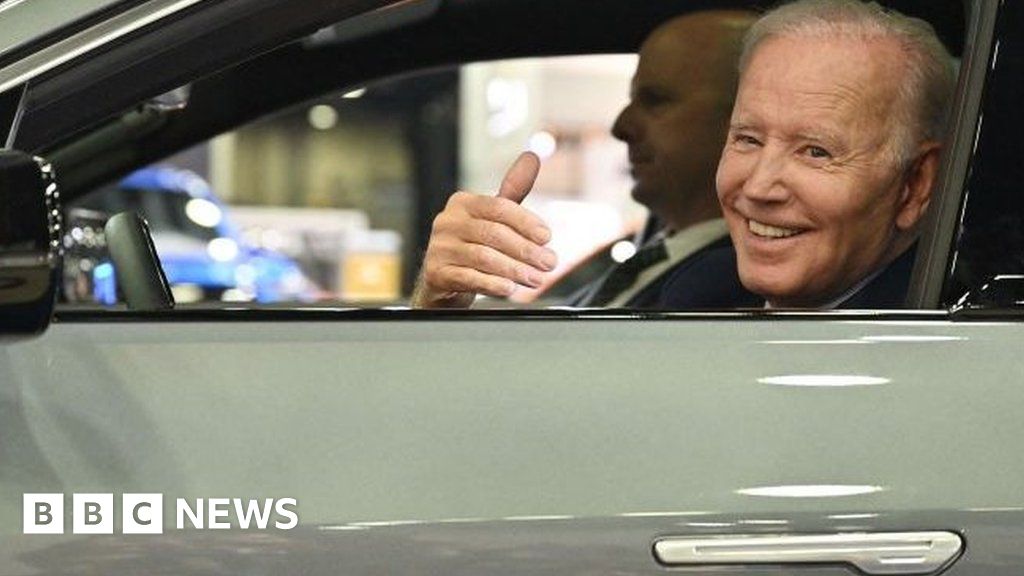Image source, Getty Images
Biden at the 2022 Detroit Auto Show
President Joe Biden announced the strictest rules on automobile tailpipe emissions ever introduced in the United States in an effort to accelerate the auto industry's shift to electric vehicles.
It includes a goal for 56% of all new American cars sold to be electric by 2032, a massive increase from current levels.
In a concession to automakers, the rule was relaxed from last year's draft.
But the Biden administration says it will continue to significantly reduce greenhouse gases.
The regulation issued Wednesday would prevent the emission of seven billion tons of carbon dioxide over the next 30 years, according to the Environmental Protection Agency.
The measure was widely welcomed by environmental groups, although some activists expressed disappointment that it was not stronger.
The United States is taking a more moderate approach than the European Union and the United Kingdom, as it will ban all sales of gasoline-powered cars from 2035.
British Prime Minister Rishi Sunak announced last year that he would postpone the British ban by five years from the original deadline of 2030.
The US auto industry cited slow growth in electric vehicle (EV) sales in its objection to a draft rule last year that would have ensured such vehicles account for 67% of all new cars sold in 2032.
Electric cars accounted for less than 8% of total new car sales last year.
Year after year, the final regulations increasingly limit the amount of pollution allowed from vehicle exhaust. Car manufacturers that do not meet the new standards will face stiff fines.
Companies will still be able to make gasoline-powered vehicles, as long as they represent a shrinking percentage of their total product line.
This rule is expected to face legal challenges from the oil industry and Republican-led states. It could eventually be settled by the Supreme Court.
The Alliance for Automotive Innovation, a trade group representing the auto industry, welcomed the slow pace of the rollout, but said the goal was still “very ambitious.”
This policy highlights the political tightrope Biden must walk.
As he runs for re-election against Republican rival Donald Trump, the president is trying to win over auto workers in the potentially pivotal state of Michigan, while also taking steps to address climate change, a key issue for many Democrats.
Trump has pledged, if he wins the November election, to repeal environmental regulations enacted by Biden.
Carolyn Levitt, a Trump campaign spokeswoman, said the rule “will force Americans to buy expensive cars they don't want and can't afford, while destroying the American auto industry in the process.”
The average selling price of an electric vehicle was about $53,500 last year, according to trade publication Kelley Blue Book, about $5,000 more than gasoline-powered cars.
The average annual salary in the United States is about $59,000.
Republican House Speaker Mike Johnson also criticized the policy, calling it “another radical anti-energy campaign that will limit consumer choices, increase costs for American families and destroy automakers.”

“Typical beer advocate. Future teen idol. Unapologetic tv practitioner. Music trailblazer.”







More Stories
JPMorgan expects the Fed to cut its benchmark interest rate by 100 basis points this year
NVDA Shares Drop After Earnings Beat Estimates
Shares of AI chip giant Nvidia fall despite record $30 billion in sales